
Rasipuram Krishnaswami Narayanaswami, better known as R. K. Narayan, was an Indian writer and novelist known for his work set in the fictional South Indian town of Malgudi. He was a leading author of early Indian literature in English along with Mulk Raj Anand and Raja Rao.

Jayaprakash Narayan Srivastava, also known as JP and Lok Nayak, was an Indian politician, theorist and independence activist. He is mainly remembered for leading the mid-1970s opposition against Prime Minister Indira Gandhi and calling for her overthrow in a "total revolution". In 1999, Narayan was posthumously awarded the Bharat Ratna, India's highest civilian award, in recognition of his social service. His other awards include the Magsaysay award for public service in 1965.
Events in the year 1993 in the Republic of India.

Mulk Raj Anand was an Indian writer in English, recognised for his depiction of the lives of the poorer class in the traditional Indian society. One of the pioneers of Indo-Anglian fiction, he, together with R. K. Narayan, Ahmad Ali and Raja Rao, was one of the first India-based writers in English to gain an International readership. Anand is admired for his novels and short stories, which have acquired the status of classics of modern Indian English literature; they are noted for their perceptive insight into the lives of the oppressed and for their analysis of impoverishment, exploitation and misfortune. He became known for his protest novel Untouchable (1935), which was followed by other works on the Indian poor such as Coolie (1936) and Two Leaves and a Bud (1937). He is also noted for being among the first writers to incorporate Punjabi and Hindustani idioms into English, and was a recipient of the civilian honour of the Padma Bhushan, the third-highest civilian award in the Republic of India.

Swami and Friends is a 1935 novel by R. K. Narayan, marking his debut as an English-language novelist from India. It is the first book in a trilogy set in the fictional town of Malgudi during British India. The novel is followed by The Bachelor of Arts and The English Teacher, completing the trilogy.

Rasipuram Krishnaswami Laxman was an Indian cartoonist, illustrator, and humorist. He was best known for his creation The Common Man and for his daily cartoon strip, You Said It in The Times of India, which started in 1951.

My Days (1974) is an autobiography by R. K. Narayan. It tells the story of Narayan's upbringing. My Days is an autobiography which starts with his childhood spent in his grandmother's home in Chennai.

Waiting for the Mahatma is a 1955 novel by R. K. Narayan.
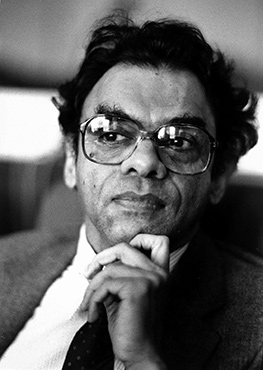
Attipate Krishnaswami Ramanujan was an Indian poet and scholar of Indian literature and linguistics. Ramanujan was also a professor of Linguistics at University of Chicago.
The Benson Medal is a medal awarded by the Royal Society of Literature in the UK.
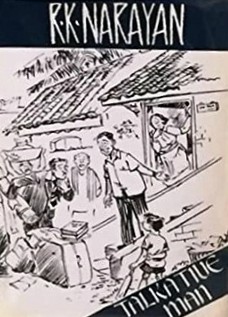
Talkative Man is a novel by R. K. Narayan first published in 1986 by Heinemann. Like his earlier novels, this one is also set in the fictional town of Malgudi. The novel is a bit short by Narayan's standards but provides the same level of enjoyment one experiences with his other writings.

The Book of Wonder is the seventh book and fifth original short story collection of Irish fantasy writer Lord Dunsany, considered a major influence on the work of J. R. R. Tolkien, H. P. Lovecraft, Ursula K. Le Guin, and others. It was first published in hardcover by William Heinemann in November 1912, and has been reprinted a number of times since. A 1918 edition from the Modern Library was actually a combined edition with Time and the Gods.

Gods, Demons and Others is a collection of short stories by R. K. Narayan adapted from Indian history and mythology, including epics like The Ramayana and Mahābhārata. In this book, Narayan provides both vitality and an original viewpoint to ancient legends.

The Mahabharata: A Shortened Modern Prose Version of the Indian Epic is a mythological book by R. K. Narayan. It is a modernised, shortened, and translated retelling of The Mahabharata. It was first published by Heinemann, London in 1978. The book was published as a result of a long endeavour that included three Hindu mythological works, Gods, Demons and Others, The Ramayana and finally The Mahabharata; in 1995, these works were republished as part of a new book, The Indian Epics Retold.
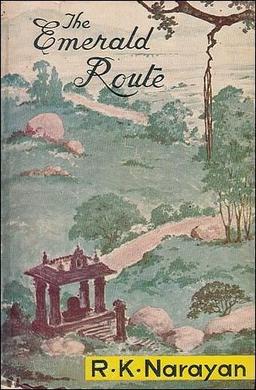
The Emerald Route is a travelogue by R. K. Narayan. It was published by Indian Thought Publications in 1980. It is a pseudo-travel guide for Karnataka, India. The book was commissioned by the Government of Karnataka, and the initial non-commercial version was published in 1977 as part of a government publication. The book is focused on local history, culture and heritage, and does not exhibit much of Narayan's characteristic personal narrative.
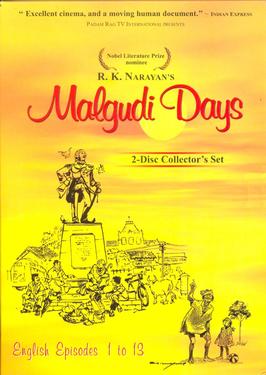
Malgudi Days is an Indian television series that premiered in 1986. Initially produced in both English and Hindi, the show is based on R. K. Narayan’s 1943 short story collection of the same name. Directed by Kannada actor and director Shankar Nag, The series was Produced by T.S. Narasimhan, with music composed by L. Vaidyanathan. Renowned cartoonist R. K. Laxman, Narayan's younger brother, contributed as the sketch artist. the series was revived in 2006 with 15 new episodes directed by Kavitha Lankesh.
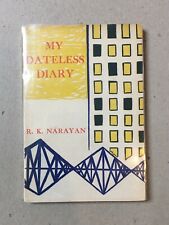
My Dateless Diary is a collection of autobiographical essays by R. K. Narayan published in 1960. The book was the output of a daily journal that he maintained during his visit to the United States on a Rockefeller Fellowship in 1956. While on this visit, Narayan also completed The Guide, the writing of which is covered in this book. The book is focused on Narayan's interactions with the American people and the people themselves. The book also highlights Narayan's view of the west, his appreciation and admiration in general, but subtle disapproval of specific aspects while making it known that there isn't much of a gap between his values and those he has come across. The book offers insights into both, the author and his subjects.

A Writer's Nightmare is a collection of essays by R. K. Narayan published in 1988 by Penguin Books. The essays included in the book are about topics as diverse as the caste system, love, Nobel Prize winners and monkeys; the book provides readers a unique view of Indian life. The essays were written at various points between 1958 and 1988; the book includes a significant essay, Misguided Guide, expressing Narayan's displeasure with the film Guide, based on his book The Guide.
Indian Thought Publications is a publisher founded in 1942, in Mysore by R. K. Narayan. Narayan founded the company as he was cut off from England owing to the war and needed an outlet for his works. The first book to be published by the company was Malgudi Days, in 1943. The publishing company followed a short-lived journal that he founded, of the same name. The company is currently managed from a tiny home-office in Chennai by Narayan's granddaughter Bhuvaneswari (Minnie).

The Grandmother's Tale and Selected Stories is a book by R. K. Narayan with illustrations by his brother R. K. Laxman published in 1994 by Viking Press. The book includes a novella, Grandmother's Tale and some other stories in the characteristic Narayan style that captures suffering through comedic narratives. The book was a bestseller in the United States.

















